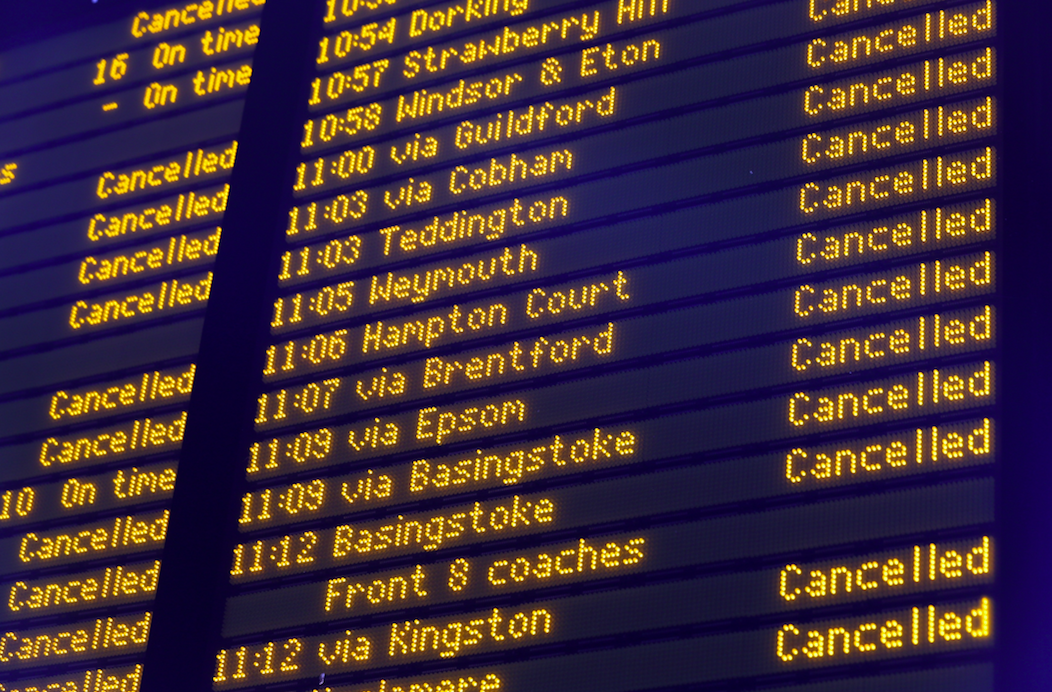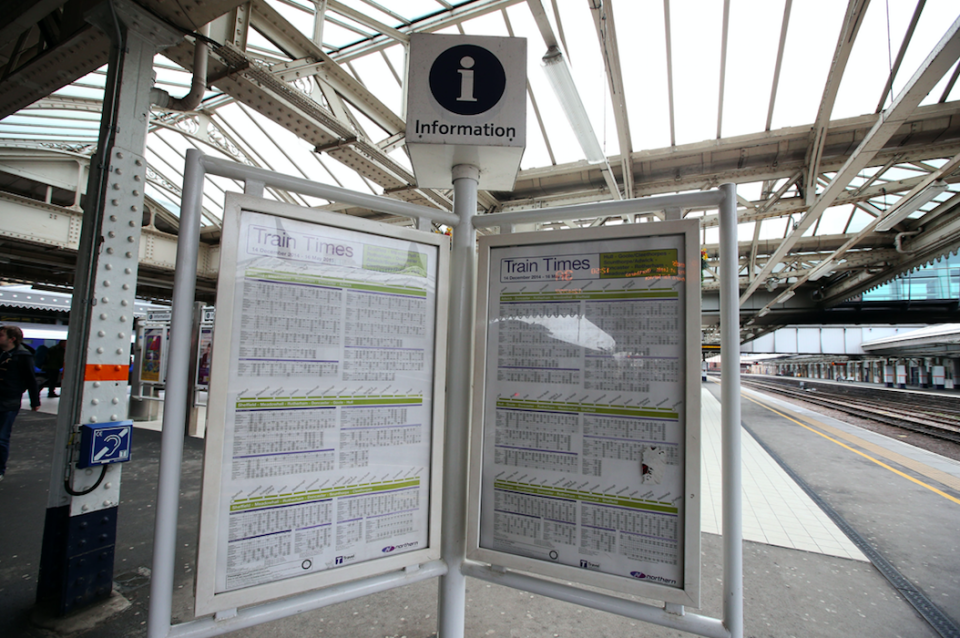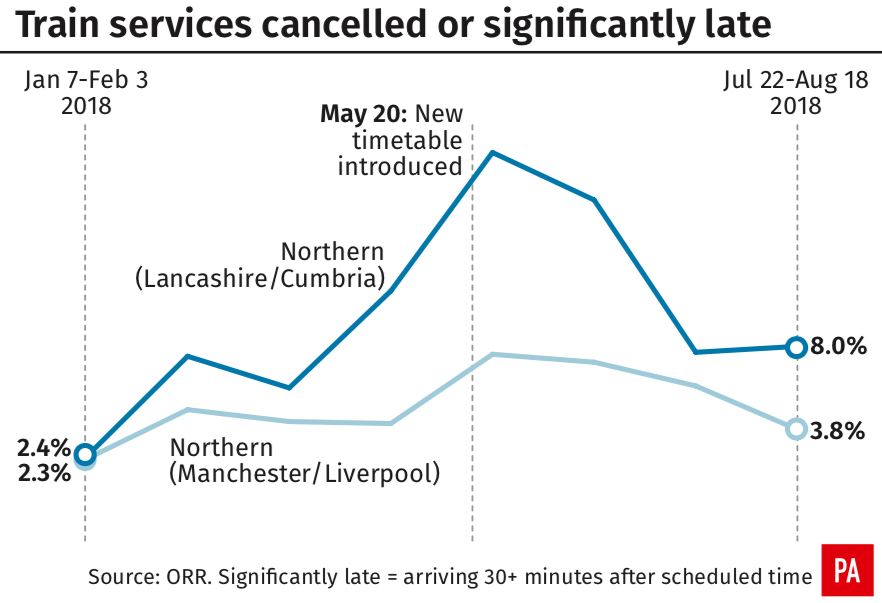Review of Britain’s railways ordered after ‘nobody took charge' during summer train chaos

The Government has ordered a major review of Britain’s railways after an investigation into what caused the May timetable disruption found ‘nobody took charge’.
The May 20 timetable change was intended to deliver huge benefits to passengers as a result of major upgrades to the network, but instead saw services crippled in the north and south-east of England.
GTR and Northern cancelled up to 470 and 310 scheduled trains respectively each weekday during the disruption, which lasted several weeks.
Passengers on Northern and Thameslink networks were particularly badly hit, leaving tens of thousands stranded by reduced or cancelled services.
More than a third (36%) of Thameslink trains were delayed by at least five minutes between May 27 and June 23, compared with 18% in the same period last year.

The proportion of Great Northern trains failing to hit the same punctuality target rose from 16% to 30%.
A series of failures have previously been blamed for the timetable chaos, including Network Rail’s delayed electrification projects in the North, poor planning by train operators and the decision by transport ministers to phase in the introduction of new Govia Thameslink Railway services.
An investigation by the Office of Rail and Road (ORR) regulator into the May timetable change concluded Network Rail, Govia Thameslink Railway (GTR), Northern, the Department for Transport and the ORR itself all made mistakes.
READ MORE ON YAHOO NEWS UK
Puppy with paws tied together by hairband found dumped outside charity shop
Watch: Garden wizard spends 273 HOURS mowing amazing patterns into his lawn
Alton Towers rollercoaster crash victims to sue theme park ‘for millions’
Inside Jack’s: Tesco’s budget supermarket to take on Lidl and Aldi
The inquiry’s interim report warned of a ‘lack of clarity about roles and responsibilities’.
Trade unions representing railway workers are not expected to be criticised in the ORR report.
They had warned that train drivers had not been given enough time to prepare for the new timetable.

It added: ‘The present industry arrangements do not support clarity of decision making: it was unclear who was responsible for what.
‘Nobody took charge.’
Transport Secretary Chris Grayling has previously insisted: ‘I don’t run the railways.’
The ORR stated: ‘The impact of this experience has had a significant financial and emotional cost to those passengers affected, directly impacting upon their work and families and in some circumstances their personal safety.’
The regulator’s 183-page report catalogued failures by various organisations which led to this outcome.
They included:
Delays with Network Rail’s electrification work in the North;
Network Rail’s unit responsible for producing timetables did not have a sufficient method of working to manage the scale of changes required;
GTR and Northern were not “properly aware or prepared” for the problems with the new timetables and did not do enough to provide accurate information to passengers when disruption occurred;
The DfT and ORR failed to sufficiently examine the assurances they received from the industry about the risk of disruption.

Events and decisions taken before January meant it was ‘probably unavoidable’ that the launch would fail, according to the report. If there was a final go/no-go decision point it was in autumn 2017.
ORR chairman Professor Stephen Glaister, who led the inquiry, said: ‘Good intentions and over-optimism within the rail industry about its ability to recover missed deadlines left no time to uncover and fix problems.
‘When problems arose, timetable planners were stretched and train operators were ill-equipped to help passengers.’
The rail review commissioned by the Government will be led by Keith Williams – deputy chairman of John Lewis and former chief executive of British Airways – who will be supported by an external panel.
A White Paper will be published next year after Mr Williams publishes his report. Reforms are expected to be implemented from 2020.
Punctuality is at a 12-year low and commuters face an increase of up to 3.2% in the cost of season tickets from January.
There is also scepticism over the franchising system following the failure of Virgin Trains East Coast.
These issues have fuelled calls for the entire network to be taken into public ownership.

Mick Whelan, general secretary of Aslef, the train drivers’ union, said: ‘The ORR report puts the blame where it belongs, at the door of the train operating companies; the DfT and Network Rail.
‘The train companies did not plan properly. They do not employ enough drivers to run the services they promise, in their franchise applications, to deliver and they started driver training far too late. The DfT was, as usual, asleep at the wheel and Network Rail was behind on track enhancements.
‘The result was that passengers suffered cancellations, delays and frustration for months. Which would have been far, far worse had it not been for train drivers, and other staff, who showed enormous flexibility in helping the companies through a crisis of their own devising.
‘Drivers – who went to work not knowing when or even if they would be able to get home – went above and beyond in helping the train companies provide a service. If it hadn’t been for our help, the disruption would have been far worse than it was.
‘The call for proper leadership – a clear indictment of Chris Grayling’s failure to deliver at the DfT – lends weight to suggestions that Theresa May’s railway review, which will also be announced tomorrow, will end up recommending a new version of the Strategic Rail Authority.”
Mr Grayling accepted that the railway ‘needs reform to prioritise its passengers’ and noted plans for closer partnerships between track and train operators on the East Coast and South Eastern routes.
He added: ‘It is vital that this review leaves no stone unturned and makes bold recommendations for the future.’

 Yahoo News
Yahoo News 

